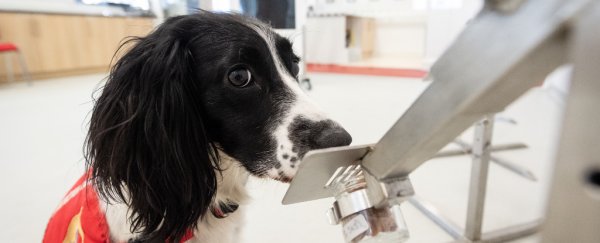Specially trained medical detection dogs could be the solution to the crisis in the lack of testing that many countries are facing during the coronavirus pandemic.
The dogs are capable of sniff testing 750 people an hour, according to the head of a non-profit which trains medical dogs.
The potential for the dogs to respond to the coronavirus pandemic is being explored by the London School of Hygiene and Tropical Medicine (LSHTM), Durham University, and the Medical Detection Dogs organisation.
LSHTM published a press release in late March describing the experimental project, which is seeking to establish whether the dogs can reliably detect COVID-19 in the way they can other disease.
They plan to train six dogs if the initial trials are successful, according to an April 17 report by Britain's Daily Mirror tabloid.
The training involves the dogs being given coronavirus patients' face masks to sniff to discover if COVID-19 has a unique odor that can be identified by a dog's enhanced senses of smell, the Mirror said.
It will take several weeks of experimentation before it will be known if dogs are able to identify the coronavirus.
James Logan, the head of the department of disease control at LSHTM, said: "It's early days for COVID-19 odor detection. We do not know if COVID-19 has a specific odor yet, but we know that other respiratory diseases change our body odor so there is a chance that it does.
"And if it does, dogs will be able to detect it. This new diagnostic tool could revolutionise our response to COVID-19."
Medical detection dogs are already used to help screen for a range of conditions including cancer, malaria and Parkinson's.
Claire Guest, CEO of the Medical Detection Dogs charity, told the Mirror: "There have already been so many fantastic achievements in the dogs' work to detect human disease, and I believe they can be trained to sniff out COVID-19."
"When resources and testing kits are low, hundreds of people can't be tested in one go. But the dogs can screen up to 750 people really quickly. By identifying those who need to be tested and self-isolate, they can stop the spread."
This article was originally published by Business Insider.
More from Business Insider:
